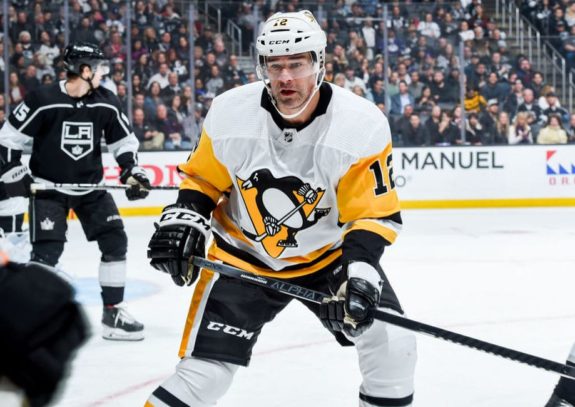
 Rob Klein
The Hockey Writers
Rob Klein
The Hockey Writers
64
Reads
0
Comments
Did the Penguins Learn From 2019 Playoff Exit?
When the Pittsburgh Penguins were swept by the New York Islanders in the first round of the 2018-19 NHL Playoffs, many questioned the team’s toughness and motivation. General manager Jim Rutherford even stated the goal of going into this 2019-20 season was to make his team tougher to play against. The Penguins played 69 games during the regular season finishing with a 40-23-6 record good for fifth in the Eastern Conference. They are set to begin a best-of-five qualifying series versus the Montreal Canadians but did this organization learn from last year’s early playoff exit and become tougher to play against?
Toughness Begins with the Captain
Sidney Crosby played just 41 games this season after coming back from a sports hernia surgery that was performed on Nov. 14, 2019. The NHL pause gave the future Hall-of-Famer an opportunity to heal up and have fresh legs possibly for the first time in his NHL playoff career.

(AP Photo/Gene J. Puskar)
There were some worries as he missed several practices and the team’s intrasquad scrimmage. However, he was able to play 20 minutes in the only exhibition game versus Philadelphia on Monday. Crosby has always been able to persevere through various injuries even with a nightly dose of elbows and abuse from the opposition. As opponents nightly try to get in his head and off his game, Crosby has historically risen above this and provided the needed on-ice discipline that is contagious throughout the locker room.
Related: Pittsburgh Penguins’ 10 Best Defensemen in Team History
“You’ve got to be physical,” Crosby said. “We might not have to lead every game in hits, but I think when there’s a time to hit and be physical, we’ve got to make sure that we do that and be able to take hits to make plays. There are different scenarios when you feel like you need to be physical. We’ve done a good job of doing that when we need to. But also not retaliating when you know that you’re going to get a shift against guys that run around a little bit. Maybe a shift or two later, doing the same thing, finishing a couple of hits. It depends on the flow of the game, but I think overall, we’re a better team when we do have an edge.” (From ‘Penguins Choose to Play Physical at Right Time,’ Pittsburgh Tribune-Review, 02/05/2020)
Blueger, Tanev & Aston-Reese are a Fearsome Fourth Line
This group formed chemistry early in the season and has been a thorn in the opponent’s side all season long. As a line, they are very eager to pick up where they left off in March when they were, at times, the most productive two-way line on the ice. Centered by Teddy Blueger and flanked by Zach Aston-Reese and Brandon Tanev, this group is the type of line that can be used as a weapon and not a default option as is the case with most fourth lines in the NHL.
The Blueger, Aston-Reese, and Tanev line will frequently draw many of the tough assignments in dangerous parts of the ice frequently against the opponent’s top line. This allows the Crosby or Evgeni Malkin line to be rested and used in the offensive zone and in better matchups.

(Amy Irvin / The Hockey Writers)
In his first season, Blueger has established himself as a valuable two-way player. He has a 70% opponent start rate, meaning coach Mike Sullivan really trusted the 25-year-old Latvian center, especially in their own zone. He also contributed offensively with 22 points (9 goals and 13 assists). Last season Tanev ranked third in the NHL in both hits (278) and blocked shots among forwards (81).
Related: Jarome Iginla’s 5 Greatest Highlights
He uses his speed and tenacity to wear down and agitate the opposition; he even got involved in a “friendly” altercation with teammate Jared McCann during the club’s final week of practice. Aston-Reese’s specialty is maintaining possession in the Penguins’ offensive zone. Aston-Reese is also a favorite with the analytics crowd. He ranks first or second in many categories that track a players’ isolated impact on defense. No regular player in the NHL was on the ice for fewer expected goals against per sixty minutes than Aston-Reese.
Key Acquisitions of Marleau, Zucker and Sheary Bolster Forward Depth
Patrick Marleau at the age of 40 has logged 1,914 combined regular and postseason games. In 19 seasons, he’s participated in the playoffs 17 times getting to the Final once in 2015-16 with San Jose losing to the Penguins in six games. After stops in Toronto, Carolina and back to San Jose, Marleau was traded back to Pittsburgh in February to provide some veteran grit and experience to a team that was struggling with injuries. The almost four-month-long pause should give the veteran fresh legs and a renewed optimism — this could possibly be his last opportunity to win his allusive Stanley Cup championship.

(Photo by Juan Ocampo/NHLI via Getty Images)
Jason Zucker was acquired in a trade from Minnesota on Feb. 10 to help replace departed forward Phil Kessel and to add top-six forward depth. This season was solid for Zucker, posting 41 points (20 goals, 21 assists) in 60 games. Twelve of the points (six goals, six assists) came in 15 games played with the Penguins before the league halted play. With Minnesota, he was only able to get out of the first round one time and now looks eager for a lengthy playoff run with Pittsburgh.
A familiar face in Conor Sheary was brought back in a trade from Buffalo to help bolster the forward depth. As a productive member of the 2015-16 and 2016-17 Stanley Cup championships, he will settle in nicely on the top unit with Sidney Crosby and Jake Guentzel.
Related: Are NHL Players the Toughest Athletes?
Ultimately the Penguins look more prepared for the 2019-20 playoffs. They are led by example from one of the toughest and determined captains in the NHL. Bolstered by a dangerous fourth line and key veteran additions should also allow Pittsburgh to roll four lines and provide valuable depth in what promises to be a grueling playoff format.
The post Did the Penguins Learn From 2019 Playoff Exit? appeared first on The Hockey Writers.
Popular Articles

















































 Blackhawks Chicago
Blackhawks Chicago Panthers Florida
Panthers Florida Penguins Pittsburgh
Penguins Pittsburgh Rangers New York
Rangers New York Avalanche Colorado
Avalanche Colorado Kings Los Angeles
Kings Los Angeles Maple Leafs Toronto
Maple Leafs Toronto Bruins Boston
Bruins Boston Capitals Washington
Capitals Washington Flames Calgary
Flames Calgary Oilers Edmonton
Oilers Edmonton Golden Knights Vegas
Golden Knights Vegas Flyers Philadelphia
Flyers Philadelphia Senators Ottawa
Senators Ottawa Lightning Tampa Bay
Lightning Tampa Bay Red Wings Detroit
Red Wings Detroit Islanders New York
Islanders New York Sabres Buffalo
Sabres Buffalo Devils New Jersey
Devils New Jersey Hurricanes Carolina
Hurricanes Carolina Stars Dallas
Stars Dallas Jets Winnipeg
Jets Winnipeg Blue Jackets Columbus
Blue Jackets Columbus Predators Nashville
Predators Nashville Wild Minnesota
Wild Minnesota Blues St. Louis
Blues St. Louis Mammoth Utah
Mammoth Utah Ducks Anaheim
Ducks Anaheim Sharks San Jose
Sharks San Jose Canucks Vancouver
Canucks Vancouver






